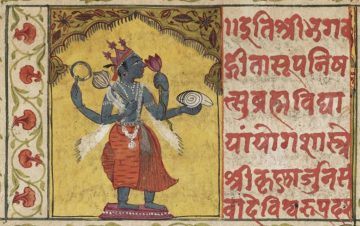Amit Chaudhuri in the TLS:
 To include the Upanishads and the Bhagavad Gita in a series called “Footnotes to Plato” may seem odd for many reasons – some obvious, some less so. But to address the oddity is invigorating, and offers a way of considering the necessity of placing these works in the wider discussion, as well as the historical and conceptual impediments to doing so.
To include the Upanishads and the Bhagavad Gita in a series called “Footnotes to Plato” may seem odd for many reasons – some obvious, some less so. But to address the oddity is invigorating, and offers a way of considering the necessity of placing these works in the wider discussion, as well as the historical and conceptual impediments to doing so.
Among the impediments is a logistical one which reveals how, in the West, value and significance are attributed according to certain classificatory norms and not others. I don’t mean the “canon”; I’m referring to a more basic category: authorship. “Footnotes to Plato” (like Western philosophy), is, generally, as much about the philosophers as it is about the philosophy. In fact, the field of knowledge called “the history of Western philosophy” could just as easily be called “the history of Western philosophers”, inasmuch as Western philosophers are the sum total of their lives and works, and we often defer to both biography and thought when we interact with the philosophy. Each body of work has a personality, but so does its author; in almost every case, we can, literally, put a “face” to the work, whether that’s a photograph of Bertrand Russell or a fourth-century BC bust of Plato.
What do we do with a philosophy when there’s no philosopher in sight?
More here.
